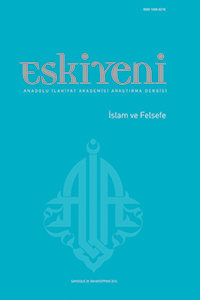Fârâbî’nin Felsefî Sisteminde İlm-i Medenî, Kelâm ve Fıkıh İlişkisi
The Relationship between Science of Society and Religious Sciences (Fıqh and Kalam) in al-Fârâbî’s Philosophical System
Author(s): Şenol KorkutSubject(s): Philosophy, Theology and Religion, Islam studies, Middle-East Philosophy, Philosophy of Law
Published by: Anadolu İlahiyat Akademisi
Keywords: al-Fârâbî; Science of Society; Politics; Religious-Islamic Sciences; Islamic Theology; Jurispuridence;
Summary/Abstract: This article examines al-kalam (Islamic theology) and fiqh (Islamic law; jurisprudence) in al-Fârâbî’s philosophical system. The two science are investigated initially as religious sciences in traditional classification of sciences in Islamic thought. But, Al-Fârâbî firstly classified sciences as theoretical philosophy and practical philosophy on the ground of traditional philosophical division of theoretical intellect and practical intellect based on Aristotle. The practical sciences consist of politics, ethic, and management of home. In this context, Al-Fârâbî nominated the sciences under the science of society as universial in respect with their themes, methods, and principles. Because of fiqh and kalam are following conditions of a specific religion, they are not formulated as the same status in terms with their sources, methods, and themes. This article examines al-Fârâbî’s descriptions of the two religious sciences, attributes of specialists of two sciences, and methods of two sciences.
Journal: Eskiyeni
- Issue Year: 2014
- Issue No: 28
- Page Range: 97-136
- Page Count: 40
- Language: Turkish

